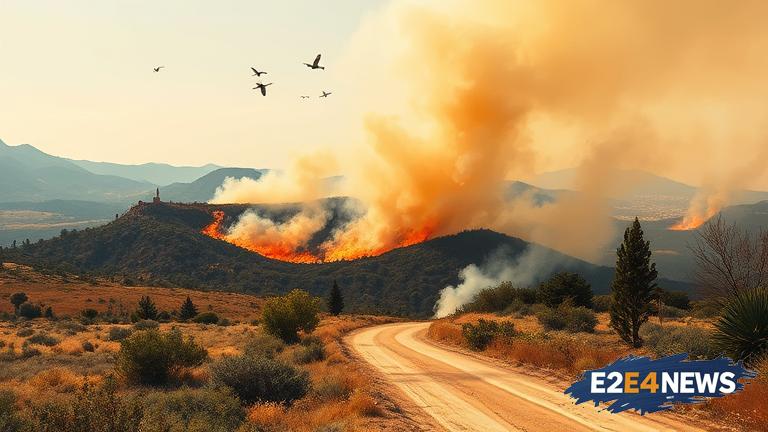Greece has been facing one of its worst wildfire seasons in recent history, with numerous blazes breaking out across the country. The fires have caused widespread destruction, forcing thousands of people to evacuate their homes and leaving many without access to basic necessities. In response to the crisis, the European Union has stepped in to provide assistance, sending firefighters, equipment, and other resources to help combat the flames. The EU’s aid package includes the deployment of firefighting planes, helicopters, and ground teams, as well as the provision of medical supplies, food, and shelter for those affected by the fires. The Greek government has also implemented a series of measures to prevent further fires from breaking out, including the creation of fire breaks and the restriction of access to high-risk areas. Despite these efforts, the situation remains dire, with many fires still burning out of control and new blazes erupting daily. The causes of the wildfires are complex and multifaceted, with factors such as climate change, drought, and human activity all contributing to the crisis. The Greek authorities are working to investigate the origins of the fires and to bring those responsible to justice. In the meantime, the focus remains on containing the blazes and providing support to those affected. The EU’s assistance has been welcomed by the Greek government, which has praised the bloc’s swift and decisive response to the crisis. The aid package is part of a broader EU effort to support member states affected by natural disasters, and demonstrates the solidarity and cooperation that exists between European countries. As the situation in Greece continues to unfold, the EU is likely to play an increasingly important role in supporting the country’s recovery efforts. The wildfires have also had a significant impact on the environment, with many areas of natural beauty and wildlife habitats being destroyed. The Greek government has pledged to rebuild and restore these areas, and to take steps to prevent similar disasters from occurring in the future. The international community has also been quick to offer its support, with many countries providing aid and assistance to Greece. The United States, for example, has sent a team of firefighters to help combat the blazes, while other countries such as France and Germany have provided financial and material support. The response to the crisis has been coordinated by the EU’s emergency response center, which has been working closely with the Greek authorities to identify areas of need and to deploy resources accordingly. The center has also been providing critical support to other countries affected by wildfires, including Turkey and Italy. As the situation in Greece continues to evolve, it is clear that the EU’s assistance will be crucial in helping the country to recover and rebuild. The bloc’s support will not only help to contain the immediate crisis, but will also provide a foundation for long-term recovery and growth. The Greek government has expressed its gratitude for the EU’s support, and has pledged to work closely with the bloc to address the root causes of the wildfires and to prevent similar disasters from occurring in the future. The EU’s response to the crisis has been widely praised, with many seeing it as a demonstration of the bloc’s commitment to solidarity and cooperation. As the EU continues to support Greece and other countries affected by natural disasters, it is clear that the bloc will play an increasingly important role in promoting resilience and sustainability across the continent.
